Winter is the time for festive cheer for most people, but for seniors, it can be harrowing. Here are some winter safety tips for seniors to keep themselves protected from the harsh cold outside.
Contents
While winters can be harsh for everybody, they are a real cause of concern for seniors. As people age, our body loses their ability to fight several health issues, and when it is the winter season, seniors are more prone to falling ill if they don’t take proper precautions.

The weather changes drastically in a short period. One moment, it is sunny outside, and the next, you can get a snowstorm. Also, seniors can lose their body heat faster than younger people, which makes it even more necessary to remain warm or suffer from hypothermia. It is also best to stay prepared so that a senior always remains safe.
If you are a senior yourself or a caregiver to one, you have come just to the right place. In the article, we have discussed some of the best winter safety tips for seniors that can help keep seniors warm and safe during harsh winters.
If interested, we also wrote about summer safety tips for seniors.
Winter Safety Tips For Seniors
#1 Keeping Your Surroundings Warm
The surroundings a senior person lives in have the most impact on their body. It is essential to keep the surroundings warm in winters to avoid any case of hypothermia. Keep the seniors inside the house as much as possible, and the house’s heating should always be on.
According to a study, the temperature in an older adult’s house should be between 65 to 78 degrees Fahrenheit. However, the actual temperature can vary depending upon the resident’s personal preference.
A temperature lower than 65 degrees can cause heat loss and make the elderly too cold. Also, temperatures above 78 degrees can result in dehydration.

Many people try to lower the energy bills by keeping the temperature at a minimum or completely switching off the heating. Do not do this ever as it can result in a very low temperature inside your house.
When going outside, make sure to keep the heating on in the car and keep an extra pair of gloves and socks and a blanket in the car.
#2 Wearing Winter Appropriate Clothes
It is essential for a senior that they wear winter-appropriate clothes to keep them warm during winters. While going out, wear warm socks, gloves, and boots to keep your hands and toes warm.
Layering up is the most important thing to do. Ensure to wear several layers of warm clothes that can be removed easily when necessary. Keep your head, ear, nose, and mouth covered with warm hats and scarves.
Even if you stay inside, make sure that you are covered all the time with proper warm clothes.
#3 Avoid Going Out Unnecessarily
In winters, try to stay inside as much as possible. Most of the time, seniors have no idea about the severity of the weather outside, and that can cause a problem. The roads would be icy and can lead to falls. There might be ice on your driveway and walkway, which can also result in falls.
Snowfall and snow storms can cause a sudden temperature drop, and you may not be bundled up enough to combat that. It is good to check the weather reports of your area before leaving your home.
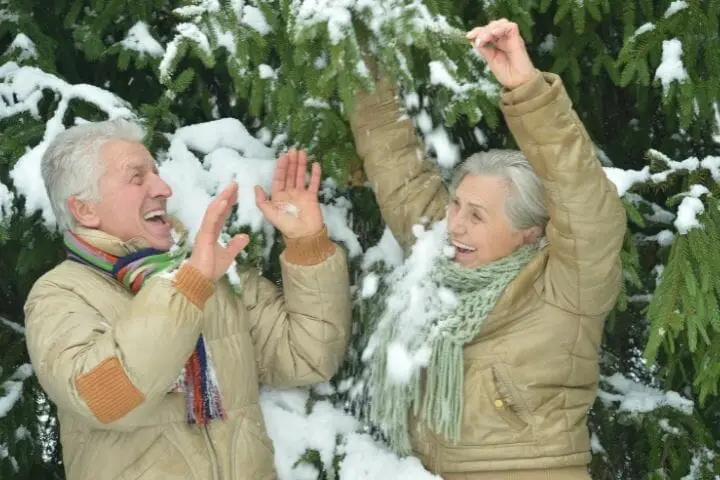
#4 Drive Safely
If it is very urgent, and you have to go outside for some work, get someone to drive you there. As people age, their reflexes slow down, and they have trouble handling or controlling the car on icy roads.
If you have to drive, then get your car winter-ready first. Get winter tires for your car, as they can make a huge difference to your safety by offering better traction on icy and snowy roads. Also, don’t forget to get your car serviced before the winter hits its full peak.
Car’s headlights, taillights, brakes, tires must be in good condition to avoid accidents. Keeping your car stocked with essentials like some snacks, water, emergency lights, blankets, and extra batteries would help if you got stuck in a snowstorm.
#5 Taking Proper Supplements
In winters, days are shorter, and most of the days, we don’t get enough sunlight, which is the main source of Vitamin D for us. Seniors also have a reduced diet compared to normal adults, which means they can not fulfill their daily requirement of vitamins and minerals with food only.
Make sure that your senior loved one takes proper supplements during winters. Vitamin D and calcium are essential as lower calcium can result in low bone density, which can lead to easily broken bones even with a minor fall.
#6 Get Your Home Winter Ready
When the harsh winter hits, your home might be your only sanctuary to help fight off the cold. Before winters, it is essential to get your house winter-ready. Check out all the doors, windows, and any other openings in your home that can be a way to lose heat.
Ensure to do weather stripping on all the windows and doors to keep the cold air out. Check your roof to ensure that it can handle the weight of snow and that there is no leakage. Get your furnace and chimney checked and serviced by a professional to avoid any issues during the peak winters.
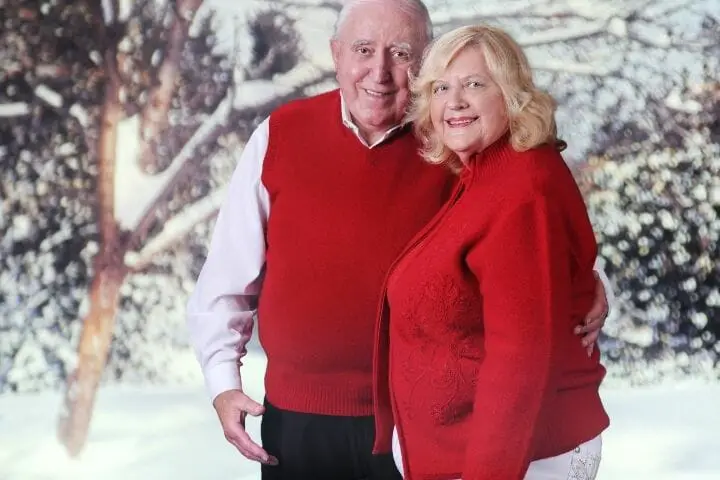
#7 Get Your Flu Shot
Seniors are always at a higher risk of developing seasonal flu. It is estimated that up to 85% of flu-related deaths happen in people age 65 and above. According to the CDC, the only way to ensure safety against seasonal flu is to get vaccinated with the flu vaccine every year. The vaccine should be taken by October month before the winter. The virus changes every year, and flu vaccines are updated to match them, so you must take the shot every year.
#8 Ensure That A Senior Is Never Alone
Leaving a senior alone is never a good idea. With old age, our body goes through many changes, and we lose the strength of our muscles and thus the ability to balance our body. This can lead to a higher risk of falling. In winters, the pavements, roads, and driveways are all covered with snow and ice and that
#9 Check For Sign Of Depression
Seniors, especially those who live in an assisted living facility, are at a high risk of developing wintertime depression as they have lesser contact with their families. When the days get shorter, and there is not enough sunlight, it can feel gloomy.
Also, since people can not get out often in winters and meet their loved ones, the feeling of loneliness can develop in most people.
A senior can’t leave their house during winters, so it is the responsibility of their family members and friends to visit them as often as possible. If visiting is not possible, then frequent calls to remind the seniors that they are not alone and all their loved ones are just a call away can also help.
#10 Keep Monitoring The Temperature
Seniors might feel colder as compared to younger people, so it is essential to monitor the house’s temperature regularly. Seniors should keep away from the areas where the temperature is low or wear extra layers of clothes to make up for it.
Apart from that, keep an eye on the body temperature. The body temperature should never drop below 95 degrees Fahrenheit. If it is lower than 95 degrees, consider it a sign of illness and act accordingly.
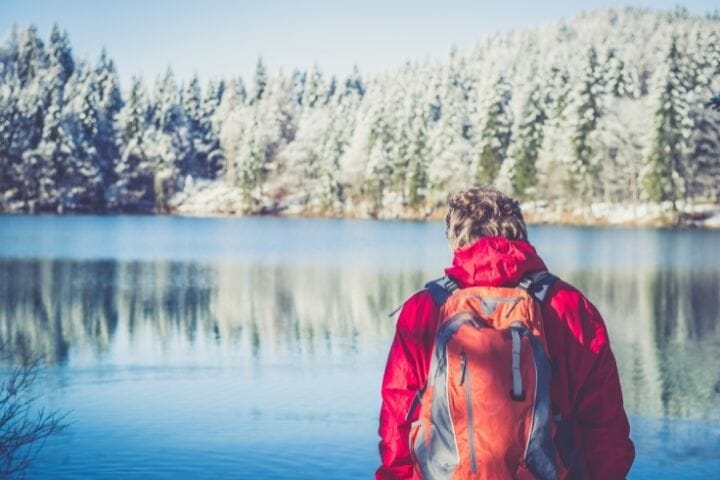
#11 Stock Up Necessary Food Items And Medicines
Check your area’s weather forecast, and if there is a snowstorm warning, then it is better to stock up your necessary food items and other essentials.
Old age people also have to be on several medications, stock up a supply worth a month or two so that you don’t run out of your medicines while there is a snowstorm outside. You can also get deliveries of the essential items direct to your doorstep without going outside.
#12 Have A Backup And Evacuation Plan Ready
Often, harsh weather conditions lead to power outages. Ensure that you have a backup and evacuation plan ready. In case of a power outage, go to a relative’s place for the time being. Keep the numbers of your family members handy, and don’t hesitate to call for help in an emergency.
Make sure to have other heating sources like gas stoves or wood to keep you warm in case the heating of your house fails. Keep extra blankets and a few emergency lights and batteries at home.
If you are aged and living alone, ask some of your family members to check up on you every once in a while.
You might like to read: Home Safety Tips for Seniors
Health Issues To Seniors During Winters And How To Avoid Them
Hypothermia
If a senior gets exposed to cold temperatures for a long time, they are at risk of developing hypothermia. Hypothermia is when a person’s body temperature falls below the average body temperature. A condition like this can be hazardous for a senior and may be fatal.
Symptoms of Hypothermia
- Body temperature below 95 degrees Fahrenheit.
- The pale and ashy appearance of the skin.
- Slowed and labored breathing.
- Having trouble walking or speaking.
- Feeling of weakness and tiredness.
- Shivering
How To Avoid This?
Don’t go outside unless necessary, and stay inside as much as possible. While going out, make sure to layer in comfortable and warm clothes and accessories.
Layering up is the way to go. 2-3 thin layers offer better protection than one thick jacket. Make sure to keep your hands, feet, and head warm.
The inside temperature of your house should never be less than 65 degrees.
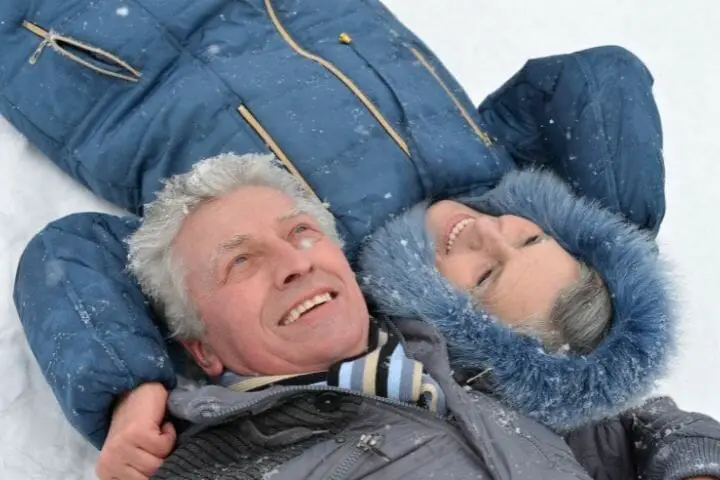
Frostbite
Whenever a body part away from our heart is exposed to extreme cold for a long time, it can develop frostbite. It is a condition in which damage to the skin goes as deep as bones. The most likely body part of developing frostbite are the toes—fingers, ears, nose, etc. In a severe case of frostbite, people can even lose their legs.
Symptoms of Frostbite
- Yellowish or gray skin.
- Hard skin
- Numbness in the body part
How To Avoid This?
If you feel that you have developed frostbite, then pour warm water on the affected part. Ensure that the water is just warm and not very hot.
Covering up your body is the only way you can avoid getting frostbite.
Injuries And Falls
Winter can lead to heaps of snow on your porch, driveway, and walkways. To get in and out of the house, people have to shovel the snow, and handling a shovel can require a lot of strength and result in injuries.
Also, our heart works at a double speed in winters trying to keep our body warm, hence falls and injuries can be dangerous for people with heart disease.
Icy pavements and roads are easy to slip on and cause a lot of falls. Falling in old age can be very dangerous for seniors as they are more prone to broken bones.
How To Avoid This?
Before choosing to shovel the snow yourself, ask your doctor whether you are fit for it or not. You can also hire someone or get a family member to do it.
Before walking on any surface, make sure that it is not icy or slippery. Hire someone to clear snow and salt your walkways and driveways.
While going out, make sure to wear boots with skid-resistant soles.
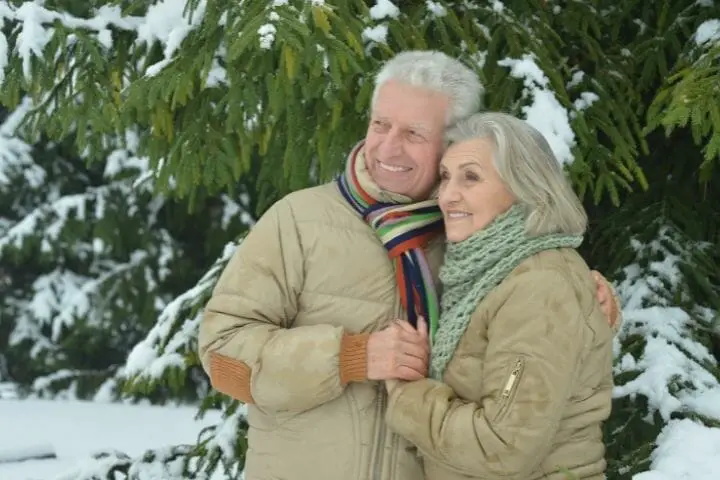
Carbon Monoxide Poisoning
Often during winters, people use their fireplace to burn wood as a heating source. Also, it is pretty standard for people to use kerosene, natural gas, or other fuels to heat their houses.
But the one thing people do not know is that if the gas stove, fireplace, or other heating sources using fuels do not have a proper venting mechanism or if they are not cleaned properly, they can release a deadly gas carbon monoxide inside your home.
The worst part about the gas is that it is odorless and transparent. When inhaled in large amounts, this gas can be deadly.
Symptoms of carbon monoxide poisoning
- Blurred Vision
- Headaches
- Nausea and Vomiting
- Dizziness
- Fainting
- Weakness and Confusion
How To Avoid This?
If you are using any gas stove inside your house, open a window slightly to let the fumes out.
All the heating elements, a fireplace, or a stove needs to be serviced and checked annually by a specialist. Do it before the start of winter to avoid any discomfort.
You can also use smoke detectors in your house, preferably in the areas where you would be using your stoves and heaters.
Avoid using stoves that are not meant for heating to heat your house during winters.
Fire
It is also very common for homes to have fire incidents during winters as people often use space heaters. Placing a space heater near a curtain or furniture can cause accidental fires.
How To Avoid This?
To avoid any fire incidents, make sure that you don’t leave it unattended while using a space heater or a stove. Also, placing the stove or heater away from loose items like curtains and beddings would be the best.
You might like to read: Tips For Preventive Care And Self Care For Seniors
How do you ensure safety for the elderly during winters?
You can follow several tips to ensure that an older adult is safe.
- Balancing their body weight is extremely important for the elderly as they have a high risk of falling and breaking their bones.
- Wearing a medical alarm device with an emergency call for help buttons.
- Go for regular health checkups to ensure no underlying health issue and proper and timely treatment if there are any.
- Having easy access to emergency contacts in case of any mishap.
- Older adults with serious health issues should never be left alone or be allowed to drive to someplace on their own.
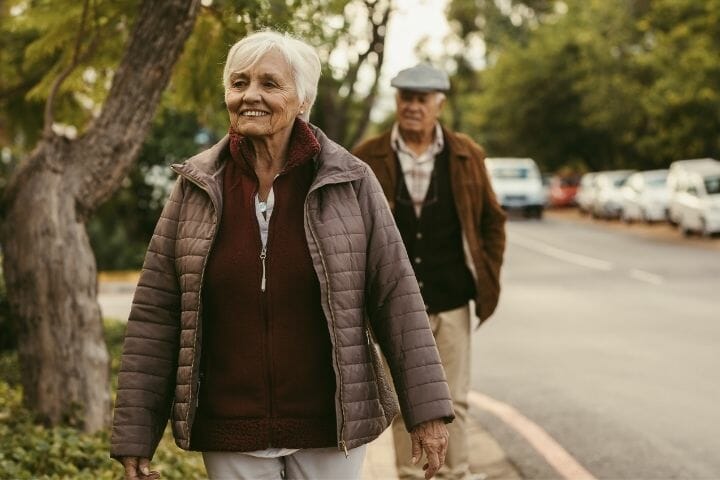
Wrap Up
A senior’s safety is essential throughout the year, but winters can be the most challenging time for a senior. But with proper care and precaution, a senior can stay warm and safe during winters.
We hope that the tips mentioned above are beneficial for you, and in case of an emergency, do not forget to call for help from your local authorities. Do share this article with others who might need this information, on your social media handles and in your groups.
